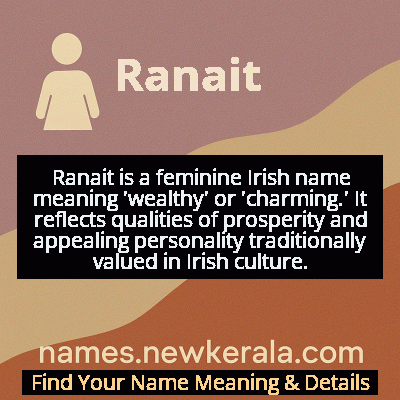Ranait Name Meaning & Details
Origin, Popularity, Numerology Analysis & Name Meaning of Ranait
Discover the origin, meaning, and cultural significance of the name RANAIT. Delve into its historical roots and explore the lasting impact it has had on communities and traditions.
Name
Ranait
Gender
Female
Origin
Irish
Lucky Number
9
Meaning of the Name - Ranait
Ranait is a feminine Irish name meaning 'wealthy' or 'charming.' It reflects qualities of prosperity and appealing personality traditionally valued in Irish culture.
Ranait - Complete Numerology Analysis
Your Numerology Number
Based on Pythagorean Numerology System
Ruling Planet
Mars
Positive Nature
Generous, passionate, energetic, and humanitarian.
Negative Traits
Impulsive, impatient, moody, and can be overly emotional.
Lucky Colours
Red, maroon, scarlet.
Lucky Days
Tuesday.
Lucky Stones
Red coral, garnet.
Harmony Numbers
1, 2, 3, 6.
Best Suited Professions
Military, sports, philanthropy, leadership roles.
What People Like About You
Courage, energy, leadership, generosity.
Famous People Named Ranait
Ranait Ní Chearbhaill
Irish noblewoman
Member of the O'Carroll clan, known for her political influence and patronage of Gaelic culture
Ranait Bean Uí Dhálaigh
Cultural preservationist
Preserved and documented Irish folklore and traditions in Connemara
Ranait O'Donnell
Educator and activist
Founded Irish language schools and promoted women's education in rural Ireland
Name Variations & International Equivalents
Click on blue names to explore their detailed meanings. Gray names with will be available soon.
Cultural & Historical Significance
In Irish folklore, characters named Ranait are often depicted as wise women or leaders who embody both traditional values and progressive thinking. The name's persistence through centuries reflects its enduring appeal and cultural resonance within Irish society. During the Gaelic Revival of the late 19th and early 20th centuries, Ranait gained renewed attention as Irish intellectuals sought to reclaim and celebrate native names that had been suppressed during British rule. Today, the name serves as a living connection to Ireland's complex historical tapestry, representing the intersection of Norse and Gaelic heritage that shaped much of Irish history.
Extended Personality Analysis
Women named Ranait are typically characterized by their natural charm and magnetic personality. They possess an innate ability to connect with others and often excel in social situations, using their diplomatic skills to navigate complex relationships. Ranait's tend to be confident and self-assured, with a strong sense of personal identity that draws others to them. Their 'wealthy' connotation extends beyond material possessions to include rich inner lives, intellectual curiosity, and emotional depth. These women are often natural leaders who inspire loyalty and admiration through their combination of grace and strength.
While they appreciate beauty and refinement, Ranait's also demonstrate practical wisdom and resilience when facing challenges. The duality of their name's meaning—both wealthy and charming—manifests in personalities that balance material success with genuine human connection. They are often described as having 'old souls' with deep understanding of human nature, combined with a modern adaptability that allows them to thrive in contemporary settings. Their strength lies in their ability to remain authentic while adapting to different social contexts, making them effective in both personal and professional spheres. Family and cultural heritage typically hold great importance to women named Ranait, who often serve as keepers of family traditions and stories.
Modern Usage & Popularity
In contemporary times, Ranait remains a relatively rare but cherished name within Irish communities, particularly among families seeking to honor their Gaelic heritage. While it has never reached mainstream popularity charts, it has experienced a modest revival in recent decades as part of the broader Celtic naming trend. The name is most commonly found in Ireland and among Irish diaspora communities in the United States, Canada, and Australia. Modern parents who choose this name often appreciate its historical depth and distinctive sound, viewing it as an alternative to more common Irish names like Siobhan or Maeve. Its usage reflects a continued interest in preserving traditional Irish names while embracing their modern relevance, with many parents drawn to its strong cultural connections and elegant pronunciation.
Symbolic & Spiritual Meanings
Symbolically, Ranait represents the fusion of material and spiritual abundance. The name embodies the concept of 'wealth' not merely as financial prosperity but as richness of character, experience, and relationships. It symbolizes the Irish cultural value of hospitality and generosity, where true wealth is measured by one's ability to share and connect with others. The charming aspect of the name signifies the power of grace and diplomacy in overcoming obstacles and building bridges between people. In a broader metaphorical sense, Ranait represents the enduring strength of Irish cultural identity—a wealth that cannot be conquered or diminished. The name carries the symbolism of ancestral wisdom passed through generations while remaining relevant in contemporary society, serving as a reminder that true value lies in cultural continuity and personal integrity rather than transient possessions.

